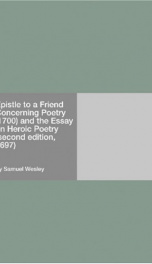Epistle to a Friend Concerning Poetry (1700) and the Essay on Heroic Poetry (second edition, 1697)

Samuel Wesley (1662-1735), is now known as the father of a great religious leader, John Wesley; in his own time he was known to many as a poet and a writer of controversial prose. His poetic career began in 1685 with the publication of Maggots, a collection of juvenile verses on trivial subjects, the preface to which, a frothy concoction, apologizes to the reader because the book is neither grave nor gay. During the run of the Athenian Gazette (1691-1697) he joined with Richard Sault and John Norris in assisting John Dunton, the promoter of the undertaking. His second venture in poetry, the Life of Our Blessed Lord and Saviour, an epic largely in heroic couplets with a prefatory discourse on heroic poetry, appeared in 1693, was reissued in 1694, and was honoured with a second edition in 1697. In 1695 he dutifully came forward with Elegies, lamenting the deaths of Queen Mary II and Archbishop Tillotson. An Epistle to a Friend Concerning Poetry (1700) was followed by at least four other volumes of verse, the last of which was issued in 1717. --This text refers to an alternate Paperback edition.
Info about the book
Author:
Series:
Unknown
ASIN:
B004TQN0AI
Rating:
4/5 (4)Your rating:
0/5
Languge:
English
Users who have this book
Users who want this book
What readers are saying
What do you think? Write your own comment on this book!
write a commentif you like Epistle to a Friend Concerning Poetry (1700) and the Essay on Heroic Poetry (second edition, 1697) try:
Do you want to read a book that interests you? It’s EASY!
Create an account and send a request for reading to other users on the Webpage of the book!


